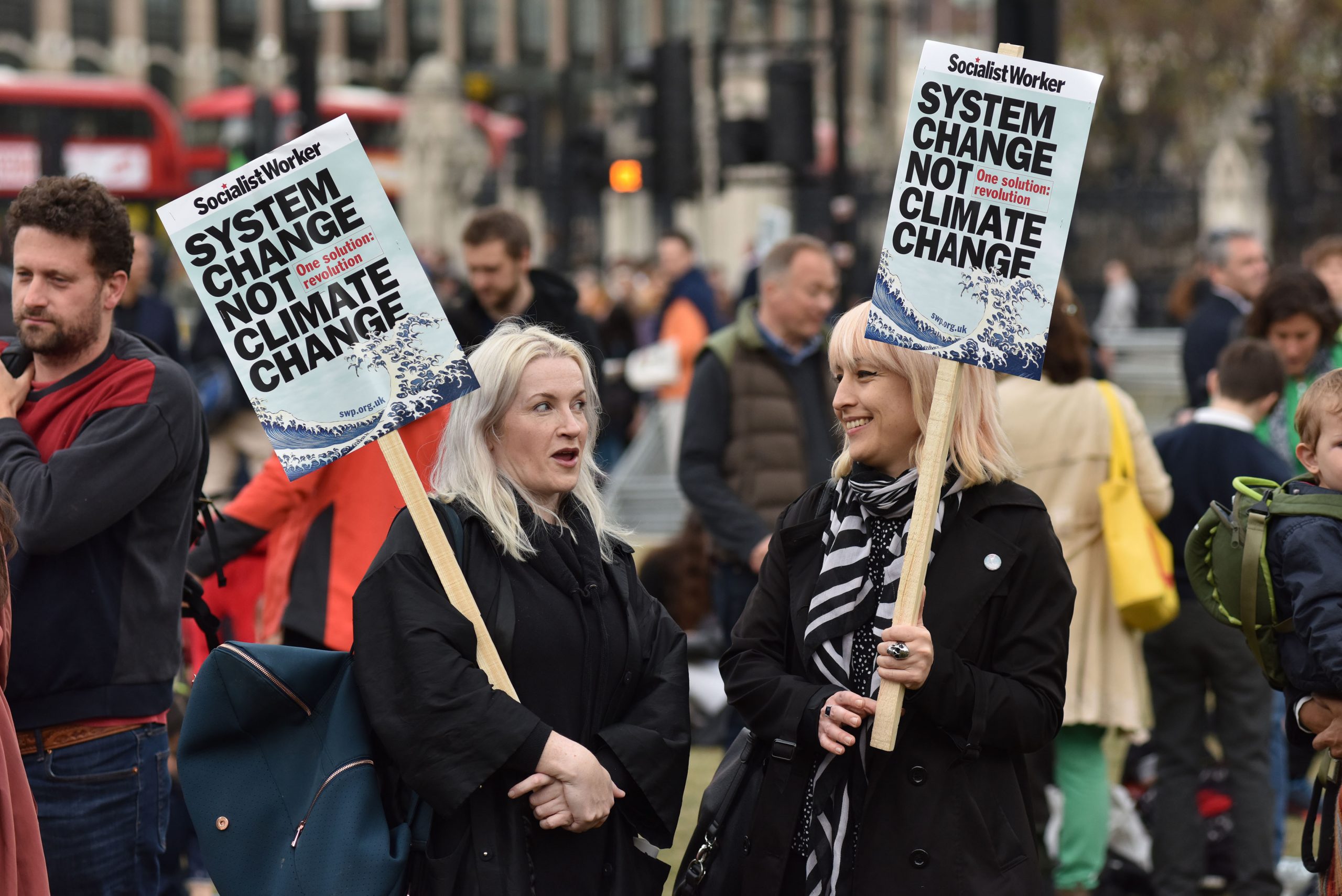Why climate activists and unions should team up
Worker unions have the power to mobilise against the lack of action on climate change in South Africa and add their voice to the call for a just transition to renewable energy.
Author:
21 October 2019

September saw one of the world’s largest ever protests. More than seven million people took to the streets to demand action on climate change as part of the first Global Climate Strike. Little noticed among the thousands of protests taking place across the world and dozens in South Africa was a trade union-led picket outside the Department of Mineral Resources and Energy in Tshwane.
Union workers mobilised to protest against the lack of action on climate change and demand a just transition away from polluting coal, oil and gas towards renewable energy. The South African Federation of Trade Unions (Saftu) and the General Industries Workers Union of South Africa (Giwusa) led the demonstration in partnership with climate justice advocacy group 350Africa.
While the protest was relatively small, its significance was not. It represented an emerging alliance between trade unions and the climate justice movement. Across the world, 73 unions and union federations representing tens of millions of workers endorsed the climate strikes.
Locally, the leadership of Saftu and the Federation of Unions of South Africa endorsed and called on workers to join and support the climate strikes. Together they represent more than 1.3 million workers.
Fossil fuel corporations and executives have long painted action on climate change as being against worker interests. But the emerging union support showed a growing recognition that inaction on climate change represents one of the gravest threats to workers’ jobs and livelihoods, and that with union leadership, climate action can protect workers and ensure a more just and prosperous future.
Uncomfortable relationship
In South Africa, the relationship between trade unions and climate activists has not always been a comfortable one.
In 2018, a rather public spat occurred between some environmentalists and the National Union of Mineworkers (NUM) over a Greenpeace report showing that air pollution in the province of Mpumalanga is among the worst in the world. The NUM accused Greenpeace of having an agenda to shut down coal mines and power stations.
The spat unearthed old tensions between some labour and climate activists. However, those tensions have often been misrepresented through a simplified narrative, which holds that all trade unions are opposed to action on climate change.
Related article:
Often missed in the discussion is nuance around the sort of climate action which some unions have been advocating. For example, major South African unions, including NUM and the National Union of Metalworkers of South Africa, have long been advocating for renewable energy and are engaged in a project known as New Eskom. The project is made up of unions and non-governmental and research organisations that are developing a vision for a just transition to a democratic and socially owned renewable energy future.
The New Eskom project reflects the radical potential that trade union voices can bring to the climate justice agenda. Whereas action on climate change can often be framed as being about simply switching to renewable energy, the climate crisis and ongoing shift to renewable energy can also be the catalyst for much more transformative change.
Privatisation fight here to stay
Rather than accepting that private interests will dominate our renewable energy future, union voices have been central in demanding a different future, one in which energy and power move further into the hands of the people. Their call is for communities and workers to play a much bigger role in owning, building, developing and benefitting from renewable energy systems.
Such a call has not been an easy one for some climate activists, given that the primary vehicle for South Africa’s renewable energy has been through the private sector, in the form of the Renewable Energy Independent Power Producer Procurement Programme (REI4P).
The REI4P has been the target of much criticism, some of it fair and some of it based on misinformation and an anti-renewable energy agenda.
Related article:
On the positive side, the REI4P has provided significant benefits, including but not limited to shielding us from the worst impacts of load shedding, lowering (yes lowering) energy costs, creating jobs, benefitting communities and, of course, cleaner energy.
However, the REI4P has not been situated in the context of a broader just transition, which protects workers and communities who might be negatively impacted as we move away from fossil fuels. Additionally, its privatised ownership model provides limited realisation of the potential for a more transformative transition.
Many climate and environmental justice activists already nominally support the notion of moving towards more socially owned renewable energy. Just how deep their commitment lies will be tested looking forward, as we determine how to salvage Eskom from an impending debt spiral, which could take the country down with it. The spectre of unbundling and increased privatisation as a response means the fight over privatisation is not going away anytime soon.
Transformative alliances
Beyond the energy sector, acting on climate change requires profound transformation across all aspects of society. As the 2018 Intergovernmental Panel on Climate Change report highlighted, meeting the vital target of restricting global warming to 1.5°C will “require rapid and far-reaching transitions in energy, land, urban infrastructure (including transport and buildings) and industrial systems”.
Such immense transformations can potentially entrench and deepen inequalities. Alternatively, it can provide a moment to transform development in a way that centres on justice and equity, and tackles poverty and inequality.
In the words of Saftu general secretary Zwelinzima Vavi, acting on climate change and a just transition should be the basis of a “profound socioeconomic transformation – this is the only way to get to achieve a zero-carbon world”.
Related article:
To ensure that the climate crisis is a catalyst for profound positive change will require a deep, powerful and intersectional movement demanding a transformative vision of climate justice. While thousands took to the streets in dozens of actions across South Africa for the September climate strikes, the movement is still far from having the needed political power to take on the power of the fossil fuel industry and other entrenched interests holding back a transformative climate agenda.
If we are to build a more powerful climate justice movement, the voices of workers and unions are a vital and powerful political constituency. However, if workers are to link arms with climate activists, then the climate movement also needs to ensure that their agenda centres and truly fights for social justice, a meaningfully just transition, and the protection and advancement of workers’ interests.
At the same time, many unions are yet to grapple with the urgency of the climate crisis and the transformation needed to stem the worst of it.
For example, the Congress of South African Trade Union’s most recent vision for South Africa’s energy future backtracks on some of its earlier ambitions on climate change, touting the lie of clean coal and calling for slowing down the uptake of renewable energy.
Related article:
If unions are to join in the cause with climate justice activists, such positions will be in need of revision and their proposals measured against what science and justice are saying is necessary to avert disastrous climate change.
If climate justice activists are able to forge a transformative alliance with labour, then South Africa may lead the world in a first of it’s kind climate strike in 2020. As Vavi recently announced, Saftu “hopes” to push for a worker-led national general strike demanding a transformative climate justice agenda. If that “hope” is to become a reality though, then a lot of work lies ahead in building alliances and mobilising from the bottom up.
In the words of Giwusa president Mametlwe Sebei, the climate disaster is being caused by “the very same system that is impoverishing us as workers”. Rather than attempting to deal with the different symptoms of that system in isolation, it is well past time that workers and environmental justice activists stood together for a transformative climate justice agenda.




